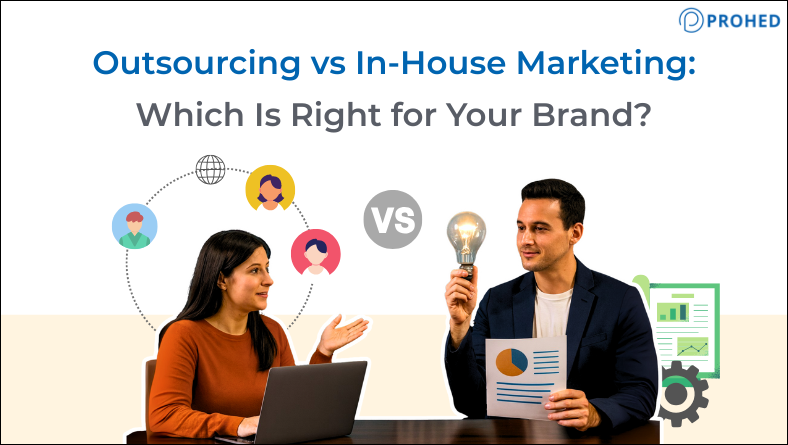In today’s fast-moving digital world, marketing isn’t just about running ads or posting on social media; it’s about building meaningful customer relationships, driving consistent growth, and staying ahead of the competition. Businesses of all sizes know that without strong marketing, even the best product or service can remain invisible.
But here comes the big dilemma: Should you build an in-house marketing team or outsource to an agency?
Both options have their pros and cons. An in-house team gives you more control and brand alignment, while outsourcing gives you access to specialized expertise at a lower cost. The right choice depends on your goals, budget, and long-term vision.
In this blog, we’ll break down both approaches in detail, compare costs, highlight advantages and disadvantages, and help you decide which strategy is best for your brand.
What Is In-House Marketing?

In-house marketing refers to establishing a dedicated marketing team within your organisation. These professionals are full-time employees who work closely with your sales, product, and management teams to execute campaigns and strategies.
Typical In-House Team Roles:
- Marketing Manager/Head of Marketing – responsible for overall strategy.
- Digital Marketer/SEO Specialist – drives online visibility.
- Social Media Manager – handles brand presence on platforms.
- Content Writer/Copywriter – creates blogs, ads, and website copy.
- Designer/Creative Team – ensures visuals match brand identity.
- Performance Marketer – manages ads and tracks ROI.
Why Brands Choose In-House Marketing:
- Stronger integration with company culture.
- Quick collaboration with other departments.
- Brand voice consistency across all campaigns.
What Is Outsourced Marketing?

Outsourced marketing means hiring an external agency, consultants, or freelancers to handle part or all of your marketing activities. Instead of maintaining a large in-house team, businesses rely on external experts who bring a wide range of skills and tools.
What Agencies Typically Handle:
- SEO and content marketing.
- Paid ads (Google, Meta, LinkedIn, etc.).
- Social media management.
- Email marketing and automation.
- Branding and creative design.
- Analytics and reporting.
Why Businesses Outsource:
- Lower overhead compared to hiring full-time staff.
- Access to highly skilled experts and premium tools.
- Flexibility, scale up or down depending on campaigns.
Key Differences Between In-House and Outsourcing Marketing Teams
To understand which option is better, let’s compare them across critical areas:
Factor | In-House Marketing | Outsourced Marketing |
Cost | High (salaries, training, tools) | Flexible, often lower overall |
Expertise | Limited to team’s knowledge | Access to multi-specialist team |
Control | Direct oversight | Shared control with agency |
Scalability | Slower, requires new hires | Faster, can scale instantly |
Creativity | May get repetitive | Fresh external perspectives |
Speed | Dependent on team bandwidth | Agencies work with experience & proven processes |
What are the Benefits of an In-House Marketing Team?
1. Deep Brand Knowledge
Since employees work with the brand daily, they understand its values, audience, and tone. This makes it easier to maintain consistent messaging across all campaigns.
2. Better Collaboration Across Departments
Being part of the same company allows the marketing team to work closely with sales, product, and customer service, ensuring campaigns are well-aligned with business goals.
3. Direct Control Over Strategy
With in-house marketing, businesses can make quick decisions and implement changes instantly without waiting for external approvals.
4. Long-Term Commitment
Employees are more invested in the brand’s success, which helps build stability, loyalty, and a strong marketing foundation over time.
Also read: How AI-Based Marketing & Ad Optimization can Boost ROAS
What are the Limitations of In-House Marketing?
1. High Costs
Building a team requires big investments in salaries, training, and tools. Recruitment and retention also add to expenses.
2. Limited Expertise
No single team can cover all areas like SEO, PPC, design, and analytics. This limits specialization and innovation.
3. Scalability Challenges
Expanding campaigns means hiring more people, which takes time and resources. Scaling isn’t as fast as outsourcing.
4. Risk of Burnout and Stagnation
Small teams often handle multiple tasks, leading to overload. Over time, creativity and fresh ideas may decline.
What are the Advantages of Outsourced Marketing?
1. Access to Expertise
Agencies have specialists in SEO, PPC, social media, and more, bringing cross-industry experience that in-house teams may lack.
2. Cost-Effective
You only pay for the services you need, with no extra expenses for salaries, training, or tools.
3. Scalability and Flexibility
Easily scale efforts during product launches or seasonal peaks, and reduce scope when needed.
4. Fresh Perspectives
Agencies work across industries, offering innovative ideas and creative strategies.
5. Access to Tools and Technology
Get advanced insights through premium tools for SEO, analytics, and automation, without investing in them directly.
What are the Disadvantages of Outsourced Marketing?
1. Less Direct Control
Since agencies handle execution, you have less day-to-day control. Adjustments may take longer compared to an in-house team.
2. Communication Gaps
There’s always a chance of misalignment in brand tone or messaging. Regular coordination and feedback are needed to stay on track.
3. Dependence on Third Parties
Your results depend heavily on the agency’s performance. If the partnership ends or quality drops, it can disrupt your marketing efforts.
Cost Comparison: Outsourcing vs In-House
When it comes to costs, the gap between maintaining an in-house team and outsourcing to an agency is often significant. Let’s break it down.
In-House Costs
Building an in-house team means hiring multiple specialists, like an SEO expert, content writer, social media manager, performance marketer, and designer. A team of 5–6 professionals can easily cost ₹30–60 lakhs per year or more in salaries alone.
But salaries aren’t the only expense. Companies also need to invest in:
- Training and development to keep the team updated with the latest trends.
- Employee benefits such as insurance, bonuses, and allowances.
- Tools and software for SEO, analytics, email automation, and CRM systems, which add another ₹3–5 lakhs per year.
This makes in-house marketing a long-term, high-investment strategy. It works well for large enterprises but is often too expensive for startups and SMEs.
Outsourced Costs
With outsourced marketing, you pay for expertise without carrying the burden of full-time salaries or overhead. Agencies usually charge in two ways:
- Monthly retainers: Ranging from ₹1–5 lakhs per month, depending on the scope of work (SEO, ads, social media, etc.).
- Project-based pricing: Flexible costs for specific campaigns, like a product launch or seasonal promotion.
The big advantage? You don’t need to spend separately on tools, training, or recruitment—the agency already has them covered.
Bottom Line
- In-House Marketing: Costlier, but gives you a team that’s fully immersed in your brand. Best suited for established businesses with large budgets.
- Outsourced Marketing: More affordable and scalable. Ideal for startups, SMEs, or companies that need flexibility and quick results.
When to Choose an In-House Marketing Team?
In-house marketing works best for companies that want full control and have the resources to sustain a team. You should consider building an in-house department if:
- You’re an established brand with a big budget
Larger companies can afford the high costs of hiring and maintaining a full team. The investment pays off in the long run through stronger brand alignment. - Marketing is deeply tied to product development and innovation
If your marketing strategy needs constant input from product and R&D teams (for example, in tech or consumer goods), having marketers in-house ensures faster collaboration and smoother execution. - You need constant brand messaging control
When consistency and tone are non-negotiable, in-house teams are better equipped to maintain the exact voice and image you want. - You want to build a long-term marketing culture
Companies focused on long-term growth often prefer in-house teams because employees grow with the brand, develop loyalty, and create a stable foundation for future campaigns.
When to Choose an Outsourced Marketing Team?
Outsourced marketing is ideal for businesses that want professional expertise without the cost and complexity of managing a full in-house team. You should consider outsourcing if:
- You’re a startup or SME with limited resources
Hiring and maintaining a full marketing department can be expensive. Outsourcing lets smaller businesses access top talent at a fraction of the cost. - You need specialized expertise (SEO, performance ads, branding)
Agencies and freelancers often bring niche knowledge that’s hard to find in a small in-house team. This ensures your campaigns are handled by experts. - You want faster results without building a large team
Outsourcing allows you to hit the ground running. Agencies already have the systems, tools, and experience needed to execute campaigns quickly. - You have short-term or seasonal campaigns
If your business only needs marketing support during product launches, festivals, or peak seasons, outsourcing is more efficient than hiring full-time staff. - You prefer flexibility and scalability
Outsourced marketing lets you scale up or down based on demand, something difficult with permanent employees.
Conclusion
At the end of the day, there’s no one-size-fits-all answer. In-house marketing gives you control, deep brand alignment, and long-term stability, but it’s expensive and harder to scale. Outsourced marketing gives you flexibility, expertise, and cost-effectiveness—but it requires trust and collaboration with external partners.
Many successful brands today are adopting a hybrid model, keeping a small in-house team for brand strategy while outsourcing execution to agencies. This way, they get the best of both worlds.
If you’re still unsure which direction to take, our agency can help. We’ve worked with startups, SMEs, and enterprises, providing tailored marketing solutions that balance cost, creativity, and growth.
FAQs
1. What is the main difference between outsourcing and in-house marketing?
Outsourcing means hiring an external agency or freelancers, while in-house marketing involves building and managing a dedicated internal team.
2. Which option is better outsourcing or in-house marketing?
Outsourcing gives access to specialized experts across multiple areas (SEO, ads, content, etc.), while in-house teams may have limited skill sets.
3. Can a brand combine both in-house and outsourced marketing?
Absolutely. Many companies use a hybrid approach, keeping strategy in-house while outsourcing execution like SEO, paid ads, or design.
4. Can outsourcing agencies handle brand-specific requirements effectively?
Yes, but it requires clear guidelines, brand manuals, and consistent communication to ensure campaigns align with brand voice and identity.
5. Is outsourcing marketing more cost-effective than in-house?
Yes, outsourcing is often cheaper since you avoid salaries, benefits, and training costs. However, in-house teams provide more control and brand familiarity.




